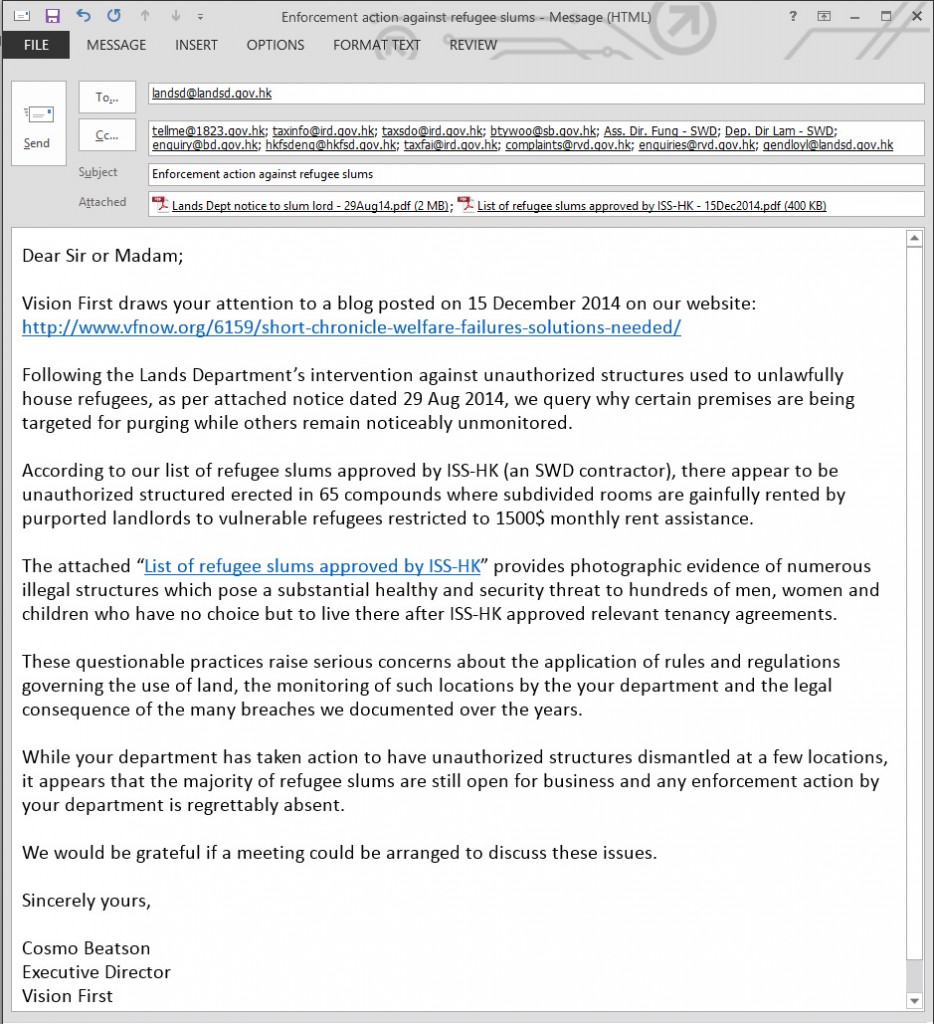Refugee child denied standard level of assistance
Jan 6th, 2015 | Food, Housing, Welfare | Comment
A few days ago Vision First wrote to the Child Protection institute querying if they had taken into consideration refugee children when writing to the SCMP saying the government is doing all it can to prevent destitution. Apparently, if the government is, its contractors are not.
Vision First reported to the Social Welfare Department the reprehensible treatment of a refugee child who has been allegedly denied rent, utility and adequate food assistance for reasons unexplainable. The boy, Samuel, was born in 2013 to a Pakistani father and Indonesian mother.
Samuel was issued with an Immigration Recognizance Form in August 2013, after which the parents requested he be added to their Agreement on Provision of Assistance. However, the mother laments, “Our caseworker refused to add our boy, because she said it was not necessary and we already got enough help.”
For reasons that remain unclear, young Samuel was not recognized by SWD contractor ISSHK as a ‘service user’ entitled to standard levels of assistance for rent, utilities and food, as determined by the Hong Kong Government. Raising a family is expensive and refugee parents are denied the right to work.
At the core of the matter was the parents’ request to change their lodging because the room in which they lived had become too small for a unit of three. They therefore located what they thought could be a suitable room priced at 4500$. However, since August 2013 the family was told by their ISSHK case-worker that the small room they occupied was sufficient and it was unnecessary for them to relocate. The caseworker (name withheld) refused to pay the security deposit and first month rent.
The family reports that ISS-HK also did not increase the electricity allowance and failed to provide sufficient food for Samuel. In recent months, the two year-old boy was allocated one box of cereal, one can of milk formula (900gr) and 10 eggs for a 10 day period. The mother, who could not breastfeed, laments that her son would finish the formula in 5 days as he didn’t have solid food.
The distress mother complained to Vision First, “This is too much painful. Why they can treat us like that?”
Good question! From our experience, it is claimed that each case is different and a case-by-case assessment is implemented, as if this was reason sufficient to dispel complaints concerning some receiving more and others less than what is said not to exist, but is factually a “Refugee Welfare Package”. In this light, Vision First is greatly concerned about what seems to be an arbitrary, biased treatment, particularly because the family claims they were told “the manager did not agree” as an explanation of service refusal.
Vision First calls on the SWD to promptly investigate this case and explain to this family, and the community in general, what guidelines are in place in this cases, why ISS-HK decided that this family should not move to a larger room after having a baby, why their utility allowance should not be increased and why Samuel was punished with a reduced food allowance at a critical stage of growth and development.
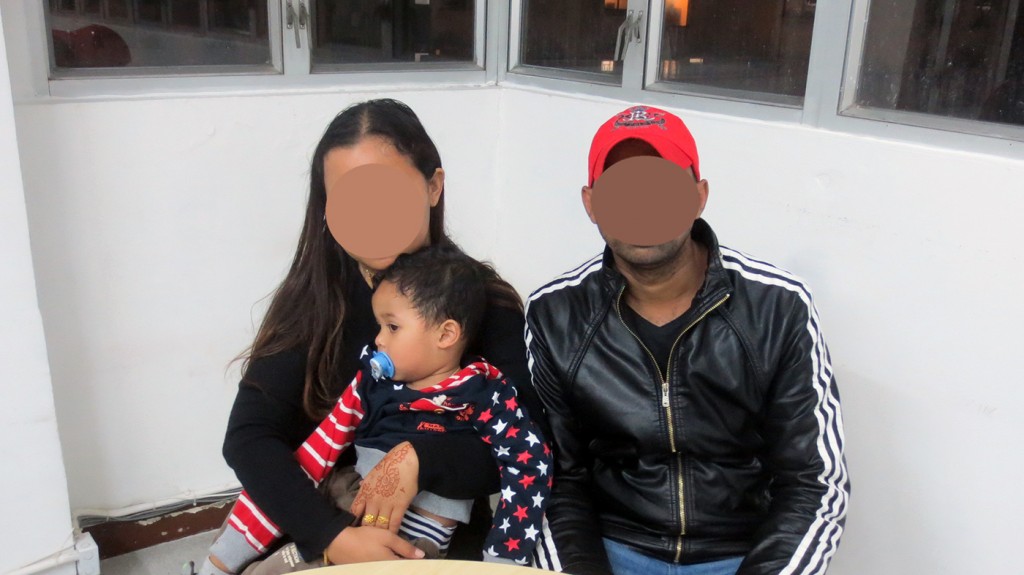
VF Report: Slum on the Hilltop ordered to be purged by Lands Department
Jan 5th, 2015 | Crime, Housing, VF Report | Comment
On 13 September 2013, Vision First reported on the Slum on the Hilltop where ISS-HK paid rent for many refugees at least since 2010, according to the oldest resident interviewed. We were informed that other refugees had lived at this location earlier, under the auspices of ISS-HK, before moving elsewhere.
At this slum Vision First collected copies of numerous Agreements on Provision of Assistance, issued by ISS-HK and duly signed by caseworkers, confirming that the refugees in question were said to officially reside at the following addresses. We cannot but query if any of them is indeed accurate:
- 6/F, House 18, Chuck San Tsuen, Yuen Long
- 89 Shek Tong Tsuen, Yuen Long
- 18 Chuk San Tsuen, Yuen Long
- DD116, Lot 1896, 1892 39 Chuk San Tsuen, Yuen Long
- 2788 Kong Tau Tsuen, Yuen Long
- G/F, House 18, Chuck San Tsuen, Yuen Long
- DD116, 1732 Chuck San Tsuen, Yuen Long
On the most part, the refugees we interviewed were visited by ISS-HK caseworkers in 2013 at the Slum on the Hilltop that was approved as a suitable residential location. It may be assumed that the purported landlord provided ISS-HK with adequate documentation for rent assistance (1200$ a month in 2013) to be approved for each refugee. This arrangement continued into 2014.
Vision First emphatically condemned this illegal structure as unsuitable for human habitation, an opinion that obviously we are not alone to share.
Fifteen months later, in December 2014, a Notice by the District Lands Office, dated 29 August 2014 informed refugees that structures had been erected at that location without approval, in breach of the conditions in the Government lease. The registered owner was required to purge the breach by demolishing or removing the unauthorized structures. Further lease enforcement action was threatened.
Vision First has learnt that following the above notice, ISS-HK caseworkers have allegedly: a) discouraged new refugee from settling in this slum; b) encouraged refugee tenants to find suitable homes and promptly move out; c) refused to approve the renewal of tenancy agreements at this location.
When the last tenants move out in a few months, the Slum on the Hilltop will be history, but questions of public concern remain
- Did the register owner inform ISS-HK that the metal containers and wooden boxes employed to house refugees were unauthorized structures unfit for human residence?
- Did ISS-HK caseworkers conduct due diligence to protect the safety and health of refugees before approving their settlement in this dangerous and unhygienic compound?
- What proof of ownership did the slum lord provide ISS-HK to facilitate rental payments from the public purse and crucially were said documents furnished to the SWD monitors?
- What measures is ISS-HK taking to relocate refugees suddenly forced out of slums, given that the current 1500$ rent allowance is wholly insufficient to secure a basic, legal room?
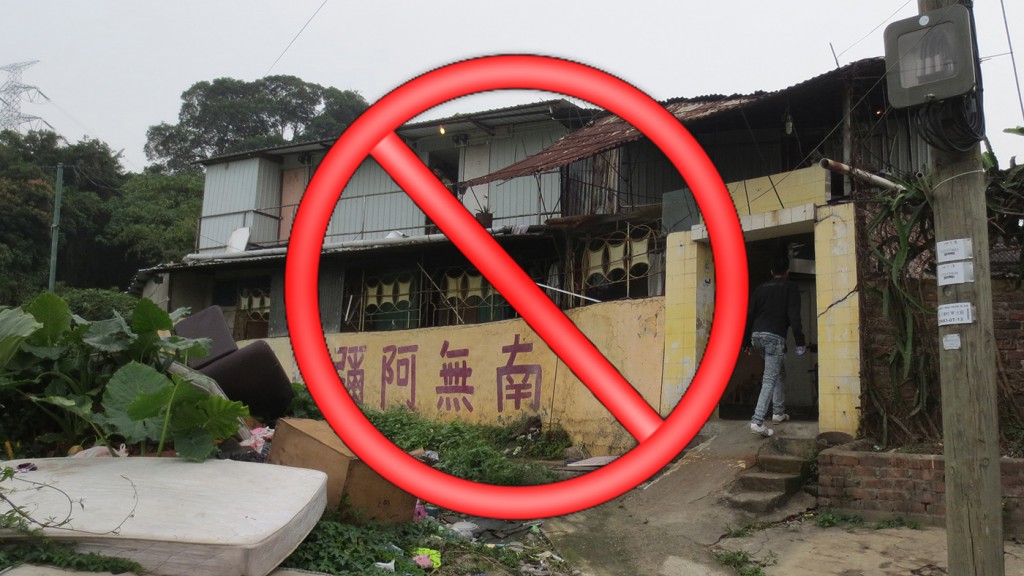
VF Report: The Slum in the Farmhouse closes down!
Dec 28th, 2014 | Advocacy, Housing, VF Report | Comment
Since 2010 Vision First visited regularly “The Slum in the Farmhouse”. Remember the purported landlady who boiled water on a fire for refugees to shower? On these visits we collected information and evidence from residents who at one point numbered 22 refugees, the overwhelming majority of whom were actively managed by ISS-HK through monthly “Agreements for provision of service” (including public rent paid with tax-dollars and home visits to approve allegedly unauthorized structures).
For two years Vision First steadfastly contended that it is wrong and immoral to subject refugees to degrading and dehumanizing living conditions. Such a contemptible practice is particularly scandalous since refugees are prohibited from working and thus cannot earn their way to better accommodation.
Vision First is pleased to report that finally something is changing!
ISS-HK seems to be reacting to the exposure of refugee slums. The Social Welfare Department contractor no longer approves certain slums as residence for refugees and advises tenants to look elsewhere for proper accommodation. Why? Is it an acknowledgement that something was improper?
While we can only speculate on ISS-HK’s decisions, we ponder why certain slums are going out of business. Do some slum lords feel pangs of guilt for exploiting refugees? Very unlikely. Is surgical enforcement action being taken by government departments to purge illegal structures only in a limited number of slums? Possibly. If information on these dreadful compounds is not readily available to these departments Vision First will ensure it will be.
Facts lead us to believe that cracks are appearing in the way refugees are segregated into slums. SWD helps us to form this opinion. In November 2014, the SWD announced a new tender dividing Hong Kong into three regions, introducing competition and launching food coupons to counter widespread irregularities in the food distribution channel.
Crucially, SWD replied to Vision First‘s questions on the tender by stressing that refugees need to be housed in legal structures. The closure of some slums (curiously not the worst structures) might indicate that Hong Kong government is no longer willing to tolerate irregularities in refugee welfare management that raised public queries and complaints.
A few months ago, refugees who lived in Slum No. 12, some for up to five years, started to report that their case workers at ISS-HK were unwilling to extend tenancy agreements in that compound. Tenants curiously admitted that “Mammy did not have the right documents” (as the slum lady was popularly called), confirming Vision First’s suspicions of irregularities.
Subsequently, expiring tenancy agreements at the Slum in the Farmhouse were not renewed and homeless refugees were not permitted to settle there. The number of ISS-HK clients in the compound steadily dwindled from almost twenty at the beginning of the year to just three in November 2014, evidence that the tide had turned.
This policy shift raises troubling questions. What will ISS-HK do with the refugees whose rooms are now been deemed improper? Does ISS-HK expect that these clients will relocated to other ‘acceptable’ slums? Isn’t this just shifting and confining vulnerable people from one dump to another?
When the last three leases will expire, the Slum in the Farmhouse will cease to exist and that is certainly a reason to celebrate. However, it seems that the plug was pulled because of reasons other than dangerous living conditions which might signify that SWD continues to support refugee slums.
VF’s original report on the Slum in the Farmhouse (4 Sep 2013)
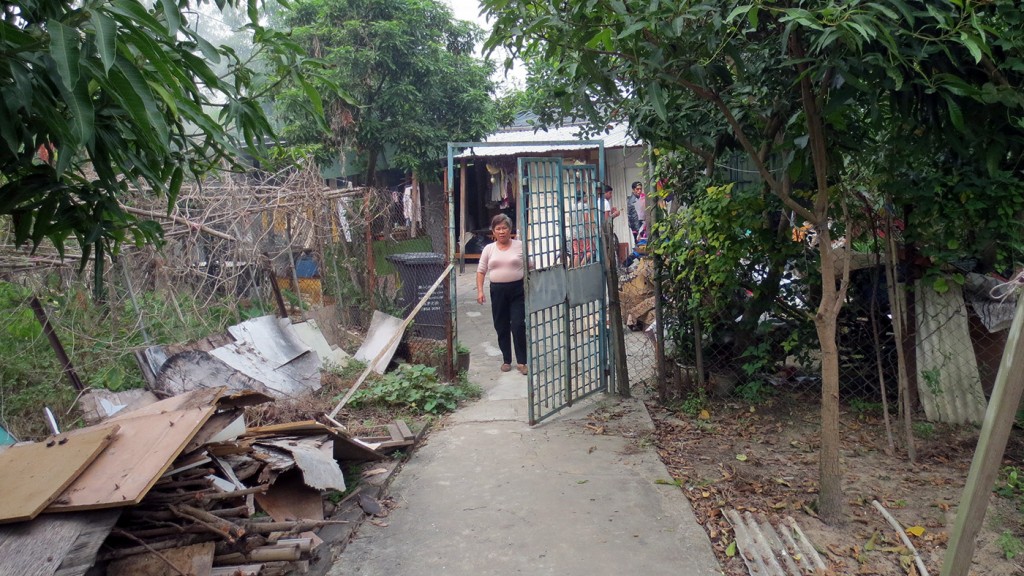
Comments to SWD replies to enquiries to tender
Dec 11th, 2014 | Advocacy, Food, Housing, VF Opinion, Welfare | Comment
On 3 December Vision First sought SWD clarification on the following points after we were invited to the tender. Vision First finds these replies largely unsatisfactory.
Comment to A.1
We question whether SWD is mistaken by operating on the assumption that refugees seek their own accommodation. SWD echoes the views previously heard from ISS-HK that the majority of refugees living in slums choose to live there and don’t want to move out. While it is true that nobody is coerced to make a home in the slums, huts were and continue to be the only locations rentable at the price point offered to refugees (currently 1500$ a month). Further, Vision First reported that the February 2014 rental increase from 1200$ to 1500$ caused ‘slum inflation’ evidenced by slum lords demanding rental increases to this day.
It is painfully obvious that the ‘persuasion process’ has limited to no effect if the rental parameters remain unchanged. In the urban areas, ISS-HK case workers frequently visit rooms, often before payments are confirmed or released. However, in agricultural-use compounds it appears, from evidence collected from refugee tenants, that slum lords and caretaker can swiftly complete transactions and have contracts approved in one visit to the ISS-HK Tsuen Wan branch.
Unlike in the urban area, security deposits and property agent fees are not required, which is a considerable financial advantage. Urban dwelling refugees report endless negotiations between reluctant landlords (refugee tenants are undesirable), property agents and case workers before any deal is completed. Why are basic legal rooms harder to rent than dodgy ones in illegal structures?
As a result large clusters of co-national refugees end up over the years in the same area. Do these men, women and children volunteer to live in dumps, or were they deprived of better alternatives?
Slum refugees are decent human beings who are not so foolish as to PREFER slums for themselves and family, if better and affordable alternatives are available.
Anyone accusing refugees of CHOOSING TO LIVE IN THE SLUMS is politically motivated and could not justify such a preposterous position in a public forum of hundreds of deprived refugees forced to live in slums, many for over 5 years. If SWD truly believes what they are saying, Vision First challenges the SWD to a public debate to support such argument before the media.
It is manifestly obvious that if refugees were provided alternative housing arrangements in legal structures in the area where they live, or in other areas close to friends and co-nationals, they would certainly move out of the slums. We have witnessed this happen on many occasions.
Comment to A.2
Thankfully the in-kind food program that exposed thousands of refugees yearly to exploitation by the operators of the food distribution chain is coming to an end. While doubting the coupon system will mark any significant improvement, Vision First cannot but interpreter SWD decision to suddenly close down the in-kind food mechanism as to be a significant statement, tantamount of an admission that not all was well in previous arrangements. It remains to be seen if law enforcement agents will take action against perpetrators of illegal activities as exposed and reported by Vision First over the last two years. Sun Tsu said: “The wheels of justice grind slow but grind fine”.
Comments to A.3
Outsourcing by its own nature creates numerous monitoring problems. Contractors worldwide cannot generally be trusted to deliver top services without strong and independent supervision. In this respect SWD’s reply is unsatisfactory. Vision First respectfully advises SWD to appoint a full-time inspection team that operates in the field all day taking leads and invitations from the refugee community quite independently from its contractors.
Many doubts come to mind. How is SWD going to implement “service inspection and performance evaluation”? How often and who will be doing this? Does this include visiting refugees at their homes, to make sure they effectively live in safe and hygienic conditions, contrary to what SWD might be told by its contractor?
Vision First will increase its watchdog role to protect the interests of refugees and report service failures. We will monitor service delivery in the three regions to ensure that demonstrable errors of the past are not repeated and do not again become systemic problems.
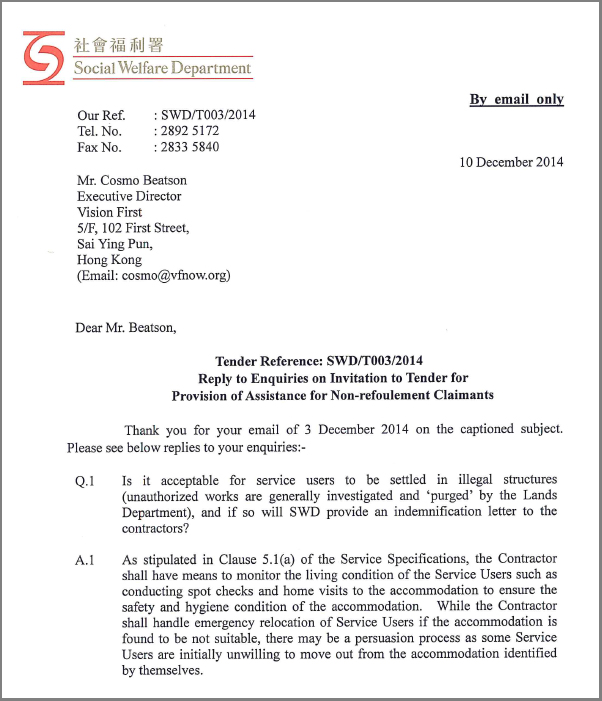
VF Reports – Refugee family faces homelessness again
Oct 27th, 2014 | Advocacy, Housing, VF Report | Comment
Vision First reports that 15 months after losing their home, a refugee family from Togo risks being homeless again with two young children. On 16 July 2013 we reported this family’s predicament when a rental increase for a rundown flat in Cheung Sha Wan put the family on the streets. ISS-HK had refused to pay a 900$ rent increase and an inexpensive 4500$ flat was lost.
Ibrahim explained that he had gone to the ISS-HK office and suggested to sleep there, if he was not booked into a guesthouse, or provided with an alternative arrangement. Instead, Ibrahim says he was removed by the police that were called to deal with a welfare issue. A less than humanitarian confrontation ensued and was reported by AM730 daily, exposing the grim reality of refugees crushed between insufficient welfare and draconian jail sentences for working.
A few days later the family was accommodated in a guesthouse where they resided for over a month. This arrangement may have cost tax-payers at least 12,000$ that we think could have been saved if 900$ had been confirmed for the original home. That wasn’t the end of it: from September 2013 till October 2014, the family was housed in a To Kwa Wan flat estimated to cost 2000$ more than the 4500$ flat they had been evicted from.
How much public money was wasted between July 2013 and October 2014?
Fast forward one year and the family faces the same predicament. On 22 October 2014 Ibrahim was notified by ISS-HK (without a letterhead) that his family would be evicted on 30 October 2014. Further, Ibrahim reported that electrical power to the flat was cut the previous week allegedly to force his eviction. He complained to the SWD Head-office and an urgent intervention by SWD staff compelled ISS-HK to supply battery-powered lamps to prevent the family from living in the dark. Now Ibrahim is worried that the water supply will be cut, as that would be unbearable for his wife and children.
Ibrahim says that he was urged to find a flat for 6000$ a month, but the family was frustrated by sky-rocketing rents and a lack of bus money to go flat-hunting around Kowloon. Ibrahim had previously reminded his ISS-HK case worker, “I don’t mind if the new place cost 1000$ or 6000$. If it is suitable for my family I will take it. But don’t tell me to pay extra money, because I don’t have money and I am not allowed to work.”
Ibrahim was hopeful when last week ISS-HK asked him to inspect another flat in To Kwa Wan that he saw and found suitable. The place was good, but there was a problem. Ibrahim was told by ISS-HK that he should find 4000$ to close the deal, as the rent is 7000$ and his rent allowance 6000$. In practice, Ibrahim requires 2000$ to top up two months deposit, 1000$ for the first month rent and 1000$ for the utility deposits. Ibrahim was stunned by what he was told, knowing that he cannot obtain any money unless he gets a job.
Vision First respectfully asks SWD to confirm that Ibrahim and his wife are authorized to work for the time they require to raise $4000 and thereafter to raise $1000 to pay the rent surplus that ISS-HK seem unwilling to provide to pay the family’s monthly rent in full.
Ibrahim commented to Vision First, “ISS gave me a budget of 6000$, but then sent me to see a 7000$ flat and expects me to find 4000$ cash! What are they thinking? My case worker told me to call NGOs and find the money. I am not a beggar and she is paid to house me. She knows I have no money and cannot work. It is shameful that ISS give refugees low budgets and then expect them to sign contracts and struggle every month to find extra money for rent!”
For nine years Ibrahim endured the inhospitable conditions of seeking asylum in Hong Kong. He has learned to speak up for himself and hold his ground as a protection claimant who, it should be noted, hasn’t been screened by Immigration Department since he arrived in October 2005.
Ibrahim assures, “This time I will go to the media myself and bring this matter to the public’s attention. I will not become homeless again without a struggle. I will refuse to move into a guesthouse where my children suffered too much last year. There was no space to move in the small room and we ate instant noodles and biscuits for a month, because we were not allowed to cook.”
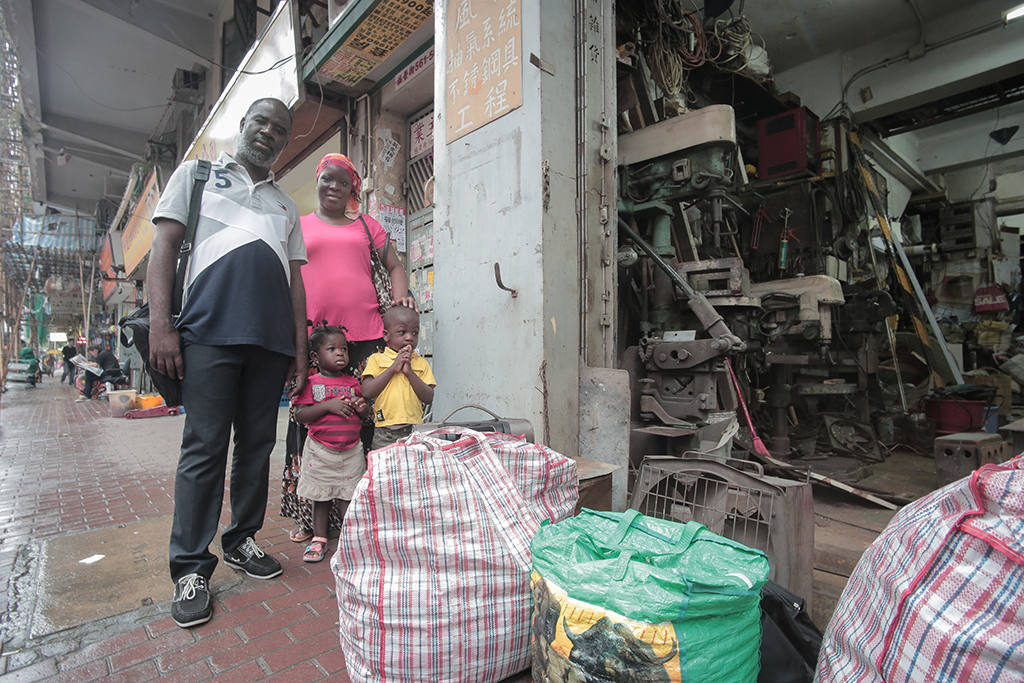
VF Reports – the deposit refund problem
Sep 29th, 2014 | Advocacy, Housing, VF Report | Comment
Vision First launches a series of blogs, under the title “VF Reports”, to make public challenges refugees report to us that we believe are of great public concern. One by one these might be considered minor cases, often personal in nature, although the troubles suffered by one person are often indicative of a wider malaise that should be thrust into the spotlight, because the predicaments of refugees endanger public safety.
On the one hand, this hardship is arguably not restricted to the refugee community, but speaks of a broader ‘humanitarian deficit’ in Hong Kong. On the other, it is the result of public attitudes and policies towards the underprivileged that may ultimately result in higher crime rates and illegality that cause undesirable, and preventable, domino effect in society.
In this respect, the “VF Reports” will draw from stories narrated by refugees and correspondence with relevant government department and agencies whose assistance Vision First seeks to remedy situations that, in our view, fail to deliver legitimate services, violate refugee rights and ultimately pose a threat to public safety as well as law and order.
Vision First reports the case of two South Asian refugees, one suffering from an incurable and transmittable disease, who informed that they recently signed a contract for a small flat in Sham Shui Po. Fearing to become homeless when previous contracts expired, these two friends took the initiative to locate a modest flat offered for 3300$ a month. They knew that the singleton rent allowance should be up to 1500$, so they agreed to share a room.
Their commendable efforts however turned into a nightmare. Familiar with local realty customs and aware that bargain flats do not remain long on the market, Vision First was told by these two middle-aged men that they persuaded a resident friend to lend them 9,250$ to close the deal. This included 3,300$ for the security deposit, 3,300$ for the first month rent, 1,650$ in agency fees and 1,000$ for the water and electricity deposits.
Satisfied with their new home, the two refugees took the paperwork to their case workers at the NGO contracted by the government to provide refugees with services. To their great disappointment, their case workers apparently said they cannot refund the security deposit, first month rent and agency fee. It is unclear why this occurred, but the two refugees reported that the refusal caused them great distress, as they had promised the kind lender to refund 9,250$ they had urgently required to secure the bargain flat they would call home.
The refugees reported that they anxiously explained to their case workers that if they hadn’t borrowed money to secure that room, the landlord would not have waited for them or for their case workers to visit and confirm the unit in the future. Time, for them, was indeed of the essence.
The two men also reported that in an attempt to find an alternative solution, their case workers apparently suggested that they give up that flat so that the case workers could pay cash for another unit. This however would imply the forfeit the money already borrowed and paid to the first unit. They pointed out that refugees are prohibited from working and had relied on a refund to repay a loan made to them in good faith, as such expenses should be paid according to these SWD instructions.
It appears that unnecessary hardship was inflicted upon these two refugees. In saying this, we do not imply that anyone concerned was at fault. It may well be that the refugees did not understand often rigidly drafted policies. However, it is obvious that these refugees are now hard pressed to seek remedies to their predicament that might raise their visibility with authorities.
These two friends might have to work to earn 9,250$ to repay the loan that secured their home. If public policy is aimed at upholding law and order, shouldn’t these two refugees be exceptionally permitted to raise emergency funds to solving this financial crisis? But work is prohibited for refugees, so do they need to turn into criminals to secure adequate housing? Wouldn’t a sentencing magistrate be keenly interested in the denial of service that caused this predicament in the first place?
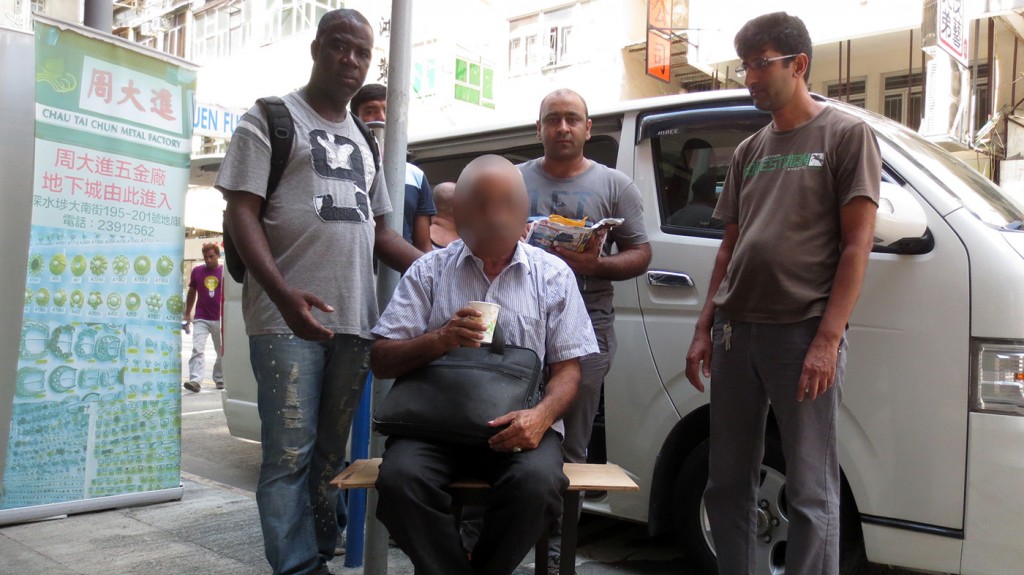
A refugee clashes with the absurd at ISS-HK
May 16th, 2014 | Advocacy, Food, Housing, Refugee Community | Comment
In September 2013, Bassirou fled deadly trouble in Niger to seek sanctuary in Hong. His ISS-HK file was opened at the Mongkok office in October, when his struggle with case worker Lok Lam commenced.
For eight months he complained to his case worker that his room was unfit for living. Bassirou is 180cm tall while the space for his mattress is 160cm long, which forces him to fold his legs to sleep. The room has no window and ventilation is a problem as he suffers from asthma.
During recent thunderstorms, the ceiling of this top floor room was flowing with rain. The cracks in the roof are so significant that one afternoon all his belongings were soaked in water. Recently three of the other five ISS clients left these crumbling premises.
The six refugees shared a subdivided flat with one toilet bowl, no bathroom or kitchen. However, Bassirou sells his food rations, not for lack of a kitchen, but because Lok Lam arbitrarily refused to provide cooking gas since October 2013. In eight months his never received toiletries either.
Bassirou sells his food for bus money. He gets 300$ for a 1200$ monthly allocation. Who keeps 900$?
When asked how he eats, Bassirou explains, “I am a man. I am strong. I put my life in God’s hands. My food is to write. My eating is my memory for everything wrong that ISS did to me. One day they will pay for everything.”
On 14 May 2013, Bassirou blasted his case worker, “You have salary. You have money for your room. You have money to eat. Everything you have, so why you don’t want to help me? Why you don’t pay for my room? Why you don’t give me gas? Why you change my food? Why you give me rubbish food?”
Lok Lam stumbled, “ISS doesn’t have money to deliver food to all people. Everyone who takes the food sells it to the Pakistani who stand outside the shops.” [N.B. Refugee are forced to sell substandard, unwanted food to buy what they really require.]
Lok Lam repeatedly instructed Bassirou to buy cooking gas and present a receipt for refund. But Bassirou was furious, “Are you crazy? How do I pay for gas, if I don’t work? I told you that I have no money to buy anything! Where I get the money?”
When Lok Lam explained, “ISS doesn’t have money to pay you gas,” Bassirou interrupted, “You mean that ISS doesn’t have little money to buy gas, but has big money to pay lawyers to take Vision First to court? So … no money for refugees, but only money for lawyers?”
Bassirou lambasted is case worker, “Before I don’t like to give you problem, but now I am very angry because I know ISS is an organization for corruption. I have many proof. You can take me to court and I will talk to the judge.”
Lok Lam concluded in frustration, “If you want to go to court, you go to court. I don’t care!”
Instead of accepting Bassirou’s request to rent a modest 3000$ flat in Tokwawan, Lok Lam advised him to move into a guesthouse in Mirador Mansion instead. This temporary solution would cost ISS-HK, and therefore Hong Kong tax-payers, about 9000$ a month – three times more than the flat.
Lok Lam described the absurd policy, “ISS will not pay 3000$ for your room, as your rent assistance is 1500$. But if you go to the guesthouse, we can pay [300$] every night and you don’t worry about rent.”
Vision First is concerned about the irresponsible disbursement of public funds entrusted to ISS-HK. What rational supports the settling of refugees in guesthouses that cost three times more than basic flats?
In a separate case a family of three was placed for several months in a guesthouse at 18,000$ a month before they secured a 4500$ apartment. Such irrational squandering raises doubts about ISS-HK financial accountability and the Social Welfare Department’s oversight.
Does somebody besides guesthouse owners benefit from such extravagance?

ISS-HK discriminates against FDH
May 13th, 2014 | Food, Housing, Personal Experiences, VF Report, Welfare | Comment
Case workers at ISS-HK fancy themselves Immigration officers in training. Instead of treating every client as a destitute asylum seeker without money or work rights, case workers tailor services according to nationality. By doing so they fail in their role as contractor for social welfare services.
The SWD instructions to ISS-HK concern “enhancing the humanitarian assistance for non-refoulement claimants” without consideration of nationality and previous immigration status. All protection claimants must be treated equally irrespective of how they arrived, or whether they work visa prior to seeking sanctuary.
Vision First is concerned about the prejudiced treatment of ex-Foreign Domestic Helper by ISS-HK case workers. To support this claim we offer a comparison between two African and two Indonesian ladies living together:
Example A: Two Somali ladies requested ISS-HK pay in full a shared 4000$ room in Kowloon. They state their claim pointing out that nothing cheaper was available, and they were banned from working. They met initial refusal with a promise of a sit-in until their non-negotiable request was met. And they got what they wanted!
Example B: Two Indonesian ladies requested ISS-HK pay in full a shared 3000$ room in a slum. They noted that the room was cheap and each could receive 1500$ rent assistance. Their case worker Tanya Tse refused to provide what they were entitled to. Tanya said, “It’s enough to give you 1400$ each. That is enough. Just sign and go!”
Tanya Tse also arbitrarily reduced the utility allowance from 300$ to 200$ each, despite the SWD clearly stating that, “300$ per month which may be used to meet different utilities charges (i.e. water, gas, electricity, etc.)”
Tanya Tse visited the room in illegal structures and signed an Agreement on Provision of Assistance bearing false information. Both Indonesian ladies were provide with ISS-HK agreements stating, “I confirm my address to be at Letter Box, XXX Shek Tong Tsuen, Au Tau”. Clearly two people cannot live inside a letter box!
Tanya Tse does not abide by the principle: “Treat other people the way you want to be treated.”
Vision First is deeply concerned about food problems at the ISS-HK appointed shops, New Bauddha and Safwan in Yuen Long. The quality problem is a shortcoming of the shops, though we understands that ISS-HK case workers are responsible for the quantity/selection problem. These issues must be addressed by the SWD:
- The rice is contaminated with excrement. A lady said, “The rice is very bad. Sometimes the rice is so smelly. Inside have shit. The rice is no good. When you finish cooking it becomes very smelly. Even if you wash very clean it is no good. All people are saying no good this rice … Everyone complain and asking how to solve this problem … Please ask them to change the rice. We cannot eat it!”
- Food selections are cut short. Milk, milk powder and Milo are not distributed despite being ticked on the order sheets. A lady complained, “If Tanya wants to give, she will give. If she doesn’t want to give, she will not give. It depends what she wants to give. Also, things like eggs and spices she never gives. I think that in one month I get 600$ [worth of foodstuff]. Sometimes she only gives onion too much and expensive food don’t give. Vegetables too much give because it is cheap. Milk, powder milk, Milo don’t give.”
- Cooking oil is insufficient despite what is selected on the forms. A lady explained, “I ask for cooking oil but only receive three small bottles a month. The very small bottles. We write the big one but they give the small one only. They give small one because it costs less money. How can we cook without oil?
- Basic toiletries, including detergent for clothes, must be distributed monthly as SWD pays ISS-HK for such provisions. Many refugee ladies share this complaint, “Sometimes they don’t give us toiletries. The shop doesn’t give every month. They give only one time in two months. The soap is not enough for us. They should give more as we need it to wash our clothes. We only get ONE toilet tissue roll each month. That is not enough for one month. If we cannot work how we buy toilet paper?”
- The food collection should be every 10 days. However, to save money over time, the ISS-HK shops progressively extend the frequency to as many as 15 days. The excuse of public holidays doesn’t hold up when distributing emergency rations to hungry people with no options. Distribution dates should be brought FORWARD, not pushed backward. A lady protested, “It is very bad, so we don’t have enough food and we are hungry. My food is not enough for 5 days. How can it last me for 15 days? They say we collect food every 10 days, but they lie. Now it is always 12 days or longer. And I don’t have any money …”
- These refugee ladies are intimidated by the male staff at the ISS-HK shops. If the ladies complain, the vendors shout back, “This is not your business. You ask your case officers. You are lucky we give you this!”It appears that these vendors believe they are engaged in charitable distribution. They forget that their bosses are paid tens of millions of dollars from the government purse to provide essential assistance to needy people. Would they speak like this to their Chinese customers?
- These refugee ladies get no redress from ISS-HK case workers. One explained, “We complain many times to Tanya and she just says, ‘Next time, next time.’ But [there is] never any change. Tanya doesn’t want us to complain. She said to me, ‘Don’t listen to what other people say. No need to complain too much!’
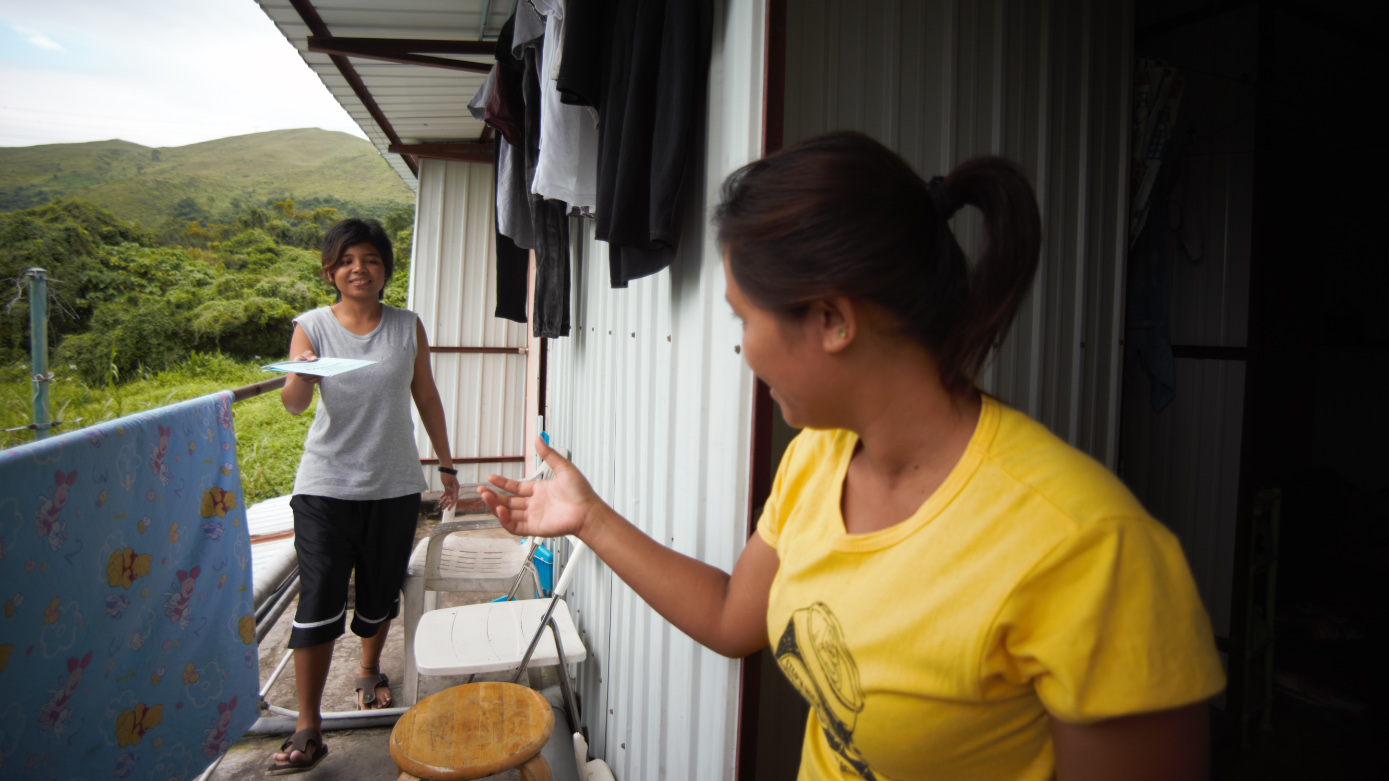
ISS-HK fails to meet basic needs of shelter and food
Apr 19th, 2014 | Advocacy, Food, Housing, VF Report, Welfare | Comment
Complaint One
Refugee Bobby lives in a converted pig farm and collects food rations at the Nepali shop in Yuen Long. He has to buy groceries when the 10-day ration runs out in 6 to 7 days. Every day is a struggle to make ends meet. A far cry from the comfortable life he had in Africa.
Bobby explains, “My family was prominent and we lived well. Because my father opposed the government everything fell apart and we were persecuted. I left to save my life. You think I come here to beg for this rubbish food ISS gives me?”
He continues, “A few months ago I went to collect food with a friend. At the shop I saw that he was getting more food than me. I said, ‘Wait a minute. This is not right’. We are both refugees. We are the same age and the same hungry. Why he get more?”
Later Bobby complained to his ISS-HK case worker Mary Lee. Mary opened his file and said, “Let me check if you used all your money.” She made some calculations and exclaimed, “You can add a few chickens and take more food.”
The hungry and destitute refugee was speechless realizing that, a) Mary had cut short his food allowance, b) Mary was fully aware how much value he was getting, c) Mary had not provide the full 1200$ food allocation when needed, d) Mary provided more food after he complained.
Bobby was furious and shouted, “Give me all my money (food value) and stop this! Bring me to the top (of my food allowance) and it is finished. This is the way we do it!”
He reported to Vision First, “Some refugees don’t complain, but if you do then ISS gives them the full amount? The problem is if you come new (new-arrival), and you don’t know, they don’t give you all the money. It is later when you complain that they give you more to shut your mouth. This is wrong!”
Complaint Two
Refugee Raja lives in an ungodly slum without clean running water, kitchen plumbing and toilet sewerage. It is no mystery that many tenants suffer from chronic gastroenteritis. He has been losing weight since he arrived in 2009 and is skin and bones now.
Raja reports, “Really this food is not enough. They say it is 1200$ a month but they are lying. Two chickens and two (pieces of) mutton for ten days is not enough. Then I must go buy (more food). Three tomatoes and two onions they want us to eat (for) ten days? I ask my friend, please give me some vegetables, (because I have) not enough.”
The distraught refugee points at a countryman writhing in pain, “Look at my friend. Look at his photo when he arrive in 2008. He was strong man. Very handsome. Before he is 68Kg and now he is 40Kg. He has so much pain (in the stomach), but hospital never give him good medicine. He suffer much. Look at him now … dying man!”
Raja cannot hide his anger, “Maybe next year he die. Then ISS is responsible. The food always make us sick. The food is expired. The vegetable is, how to say? … Bad, very bad … cannot eat it! We are sick from ISS food. We have pain (in the stomach, then) we are hungry but cannot eat. So much pain!”
He continues, “I am from India but only in Hong Kong I (have been) hungry! So much pain. I complain to (case worker) Felicity Wong, but she don’t listen. I say to her my food is not enough, my food is 250$ not 400$, but she don’t care. Who make inspection of this problem? Me not (allowed to) working. I have no money for buying food. This veeery big problem. Where the money coming???”
Complaint Three
Refugee Ali is a respected leaders of the Pakistani community in asylum. He speaks with self-assurance and brings to the debate the experiences of many suffering individuals and families. That the Pakistani shop in Yuen Long last week gave him a can of baby formula with 19 days to expiry will be overlooked for now (Shops buy close-to-expiry supplies to maximize profits).
Ali explains another widespread trick ISS-HK adopts to manipulate food, one reported by many. Case workers and refugees select the food items by ticking a food collection sheet monthly. As prices are not indicated, refugees have no assurance the total is worth 1200$. But refugees appraise value upon collection.
Problems arise when case workers call refugees to say, “Sorry your choice of X is cancelled because you are OVER BUDGET.” There no point protesting over the phone as ISS-HK controls distribution.
Hundreds if not thousands of refugee complain about the “Over Budget Problem” that deletes essential items previously confirmed. It remains to be seen if the food sheets were subsequently amended and, even if they were, the system is inefficient at best.
Ali explained that in early April his case worker Mary Lee called to again reduce his allocation. Mary Lee, a veteran staffer who should know better, keeps getting prices wrong because the price list is hidden.
The “Over Budget Problem” makes victims of refugees who have no control. Vision First is concerned that ISS-HK shop do not provide a copy of the food collection list to refugees as standard practice. This means that refugees denies refugees to keep the system in check.
It should be noted that unilateral alterations are the norm, not the exception. Refugees lament the “Over Budget” phone calls that frequently deprive them of necessary items. Vision First is concerned about the discrepancies between the food selection sheets and the rations refugees take home.
The current arrangement brings the system into disrepute and could be easily remedied by publishing a price list for case workers and refugees to calculate openly and transparently.



